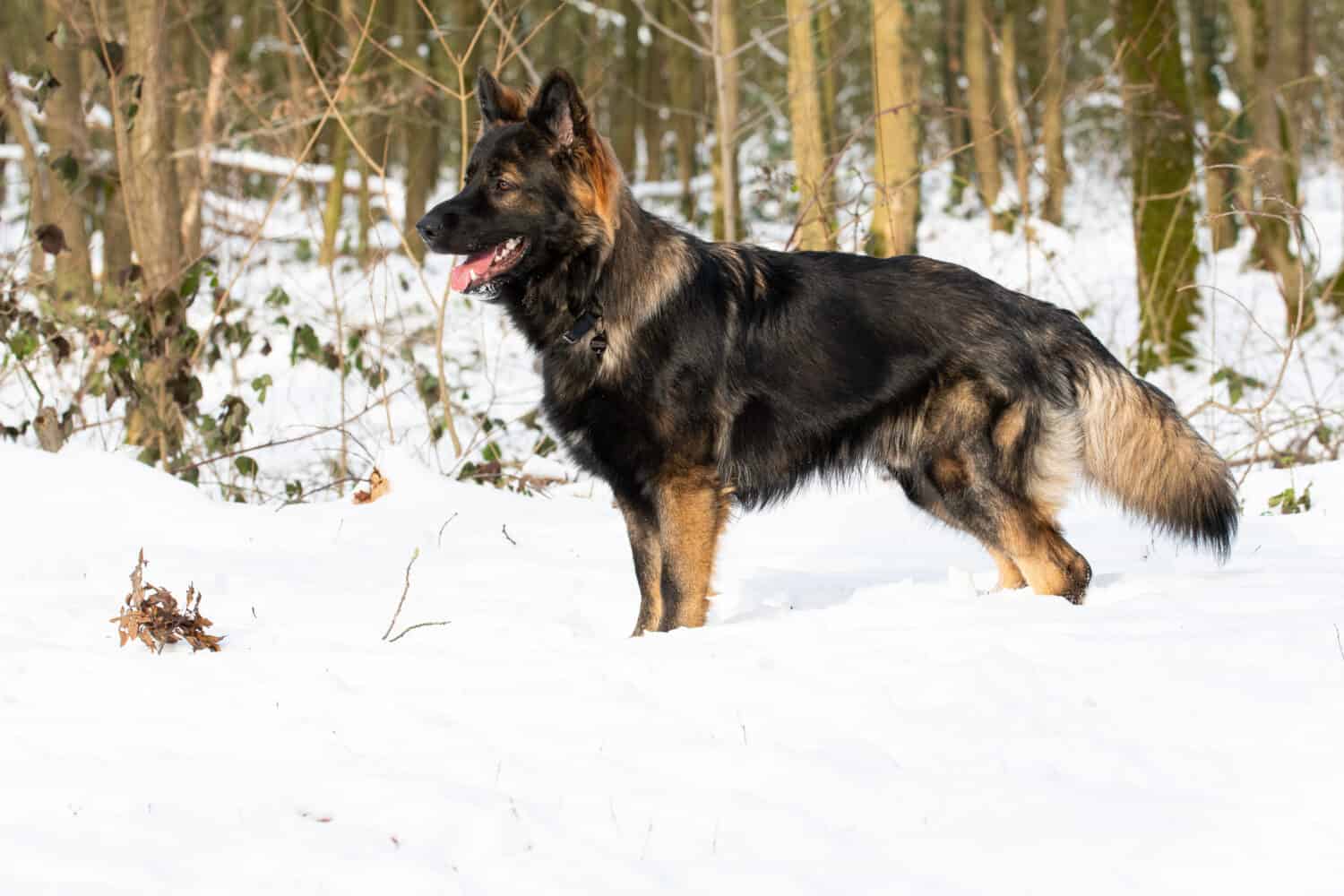King Shepherds tend to be healthier than many other dog breeds. Despite some common misconceptions, these dogs aren’t actually purebred. Instead, they’re a newer “breed” created by mixing several different breeds together, including the German Shepherd and Malamute.
Because they’re a mixed breed, these dogs have a lower chance of inheriting genetic conditions. However, they are still prone to some health issues, largely due to their massive size.
Having a dog that weighs nearly 100 pounds puts a lot of wear on their joints and organs. Here are the most common King Shepherd health problems:
1. Joint Disorders

Hip dysplasia is developed while your King Shepherd puppy is still growing. However, they may not display symptoms for a few years.
©josephgruber/iStock via Getty Images
King Shepherds are prone to both hip dysplasia and elbow dysplasia. You can expect a large minority of King Shepherds to have at least one of these conditions. While good breeding can help prevent both joint disorders (as there is a genetic factor), it cannot prevent them completely.
Environmental factors also play a role, particularly in how the dog was fed and exercised as a puppy. It’s important to feed your canine large-breed puppy food when they are growing. Larger puppies need different nutrients than smaller puppies due to their much longer growth period.
Puppy food designed for larger dogs is formulated with these different nutritional needs in mind.
You should also avoid overexercising your King Shepherd when they are growing. Too much exercise can wear down the joints while they’re still forming, leading to hip dysplasia.
2. Skin Issues

Both German Shepherds and King Shepherds are prone to skin issues of practically any sort.
©Vach cameraman/Shutterstock.com
King Shepherds seem particularly prone to skin issues, including pyoderma. This serious skin infection usually occurs in dogs with minor itchy skin (which is often caused by allergies). Due to the itchiness, the dogs scratch their skin and cause more irritation. Eventually, the skin breaks and bacteria are provided with an entry point.
It’s important to provide your dog with quick treatment if you notice excessive itchiness. While the underlying causes of itchiness are often not serious, the side effects of not treating the itching can be.
3. Gastric Dilatation Volvulus

Great Danes have the highest instances of gastric dilatation volvulus in the dog world due to their extremely large size.
©verky01/Shutterstock.com
This exceptionally serious condition occurs when the stomach fills up with gas. Sometimes, the stomach also twists, which prevents the gas from escaping. Either way, the dog’s stomach expands, eventually pressing on the inside of the abdominal cavity. With enough pressure, blood flow is cut off, and tissues begin to die.
Sadly, this condition can cause death in only a few hours. The trick is to treat it before the stomach tissue starts to die. If too much tissue dies before the dog undergoes surgery (which is necessary in most cases), the dog cannot be saved.
We don’t know why this condition occurs. However, it does seem to happen most often in larger dog breeds. Currently, there are many theories on how to prevent this condition, but none of them have been proven by science.
4. Progressive Retinal Dysplasia

Progressive retinal atrophy occurs in most dog breeds, so this condition isn’t rare.
©Korneeva Kristina/Shutterstock.com
Sadly, this fairly common dog eye condition has also entered the King Shepherd. This genetic condition isn’t curable and usually leads to blindness. It causes the retina in the dog’s eyes to degrade over time, slowly degrading their eyesight as well. Careful breeding can help prevent this condition, as it is purely genetic.
Be sure to adopt your King Shepherd from a quality breeder who performs health testing. Good breeding won’t always prevent all genetic problems but can prevent 99% of them.
5. Digestive Sensitivity

You may have to try several foods until one sits well on your dog’s stomach. Sometimes, your dog may even become sensitive to a food they’ve been eating for years.
©Snezhana_G/Shutterstock.com
King Shepherds have inherited a rather sensitive stomach from their German Shepherd bloodline. They tend to have minor diarrhea for seemingly no reason, though some may end up with chronic diarrhea. A high-fiber diet or switch in the dog’s main protein can sometimes help.
Colitis is also reported in this breed and can cause chronic diarrhea. This digestive condition occurs when the large intestine is inflamed. Just about anything can cause this condition, including trauma, infections, parasites, and seemingly nothing at all. Stress is one of the leading causes – even relatively minor stress in at-risk dogs.
There isn’t a sure cure for this digestive sensitivity or colitis. Typically, vets recommend switching the dog’s diet, fasting for a day or so, increasing fiber intake, adding probiotics, or lifestyle changes.
Often, it’s a matter of trying several different treatments until one seems to work for your King Shepherd.
Ready to discover the top 10 cutest dog breeds in the entire world?
How about the fastest dogs, the largest dogs and those that are -- quite frankly -- just the kindest dogs on the planet? Each day, AZ Animals sends out lists just like this to our thousands of email subscribers. And the best part? It's FREE. Join today by entering your email below.
Thank you for reading! Have some feedback for us? Contact the AZ Animals editorial team.








